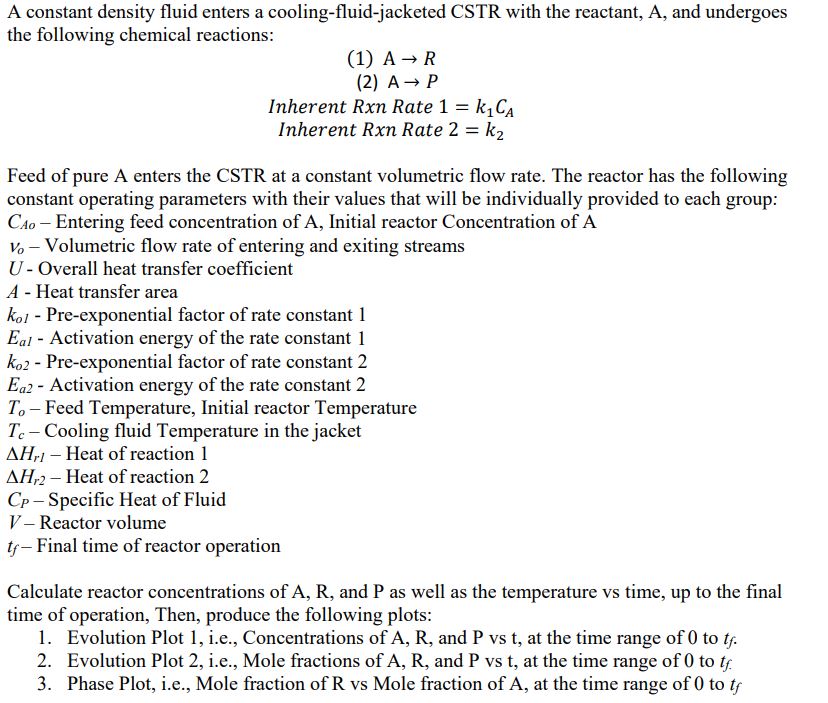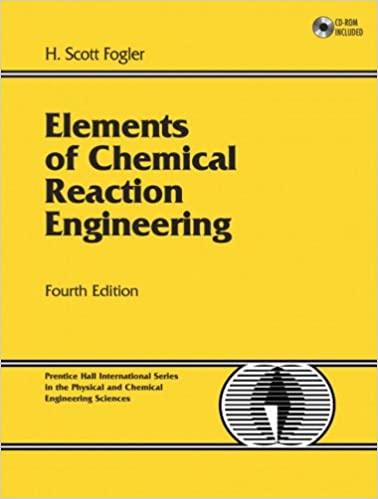Question
A constant density fluied enters a cooling fluid jacket CSTR with the reactant, A, and undergoes the following chemical reactions: A R A P Inhereent
 A constant density fluied enters a cooling fluid jacket CSTR with the reactant, A, and undergoes the following chemical reactions:
A constant density fluied enters a cooling fluid jacket CSTR with the reactant, A, and undergoes the following chemical reactions:
- A R
- A P
Inhereent Reaction Rate 1 = K_1*C_A
Inherent Reaction Rate 2 = K_2
Feed of pure A enters the CSTR at a constant volumetric flow rate. The reactor has the following constant operating parameters:
Calculate: Reator concentrations of A, R, and P as well as the temperatire vs time, up to the final time of operation.
Terms:
C_Ao Entering feed concentration of A, Initial reactor Concentration of A
v_o Volumetric flow rate of entering and exiting streams
U - Overall heat transfer coefficient
A - Heat transfer area
k_o1 - Pre-exponential factor of rate constant 1
E_a1 - Activation energy of the rate constant 1
ko_2 - Pre-exponential factor of rate constant 2
E_a2 - Activation energy of the rate constant 2
To Feed Temperature, Initial reactor Temperature
Tc Cooling fluid Temperature in the jacket
Hr1 Heat of reaction 1
Hr2 Heat of reaction 2
CP Specific Heat of Fluid
V Reactor volume
tf Final time of reactor operation
Given Parameters:
C_Ao = 5000 mol/m^3
v_o = 0.9 m^3/min
U = 100 w/m^2
A = 10 m^2
k_o2 = 1*10^-2 sec^-1
k_o1 = 1*10^-3 mol/(m^3*sec)
Ea_2 = 10000 J/mol
Ea_1 = 10000 J/mol
T_0 = 298 K
T_C = 298 K
Delta H_r2 = -250000 J/mol
Delta H_r1 = -250000 J/mol
V = 1000 m^3
t_f = 23000 Sec = 383.3 min
CP = 500 J/(mol*K)
Please answer using handwritten work thank you
A constant density fluid enters a cooling-fluid-jacketed CSTR with the reactant, A, and undergoes the following chemical reactions: (1) AR (2) AP Inherent Rxn Rate 1=k1CA Inherent Rxn Rate 2=k2 Feed of pure A enters the CSTR at a constant volumetric flow rate. The reactor has the following constant operating parameters with their values that will be individually provided to each group: CAo - Entering feed concentration of A, Initial reactor Concentration of A vo - Volumetric flow rate of entering and exiting streams U - Overall heat transfer coefficient A - Heat transfer area kol - Pre-exponential factor of rate constant 1 Eal - Activation energy of the rate constant 1 ko2 - Pre-exponential factor of rate constant 2 Ea2 - Activation energy of the rate constant 2 To - Feed Temperature, Initial reactor Temperature Tc-Cooling fluid Temperature in the jacket Hrl - Heat of reaction 1 Hr2 Heat of reaction 2 CP Specific Heat of Fluid V - Reactor volume tf-Final time of reactor operation Calculate reactor concentrations of A,R, and P as well as the temperature vs time, up to the final time of operation, Then, produce the following plots: 1. Evolution Plot 1, i.e., Concentrations of A,R, and P vs t, at the time range of 0 to tf. 2. Evolution Plot 2, i.e., Mole fractions of A,R, and P vs t, at the time range of 0 to tf. 3. Phase Plot, i.e., Mole fraction of R vs Mole fraction of A, at the time range of 0 to tfStep by Step Solution
There are 3 Steps involved in it
Step: 1

Get Instant Access to Expert-Tailored Solutions
See step-by-step solutions with expert insights and AI powered tools for academic success
Step: 2

Step: 3

Ace Your Homework with AI
Get the answers you need in no time with our AI-driven, step-by-step assistance
Get Started


